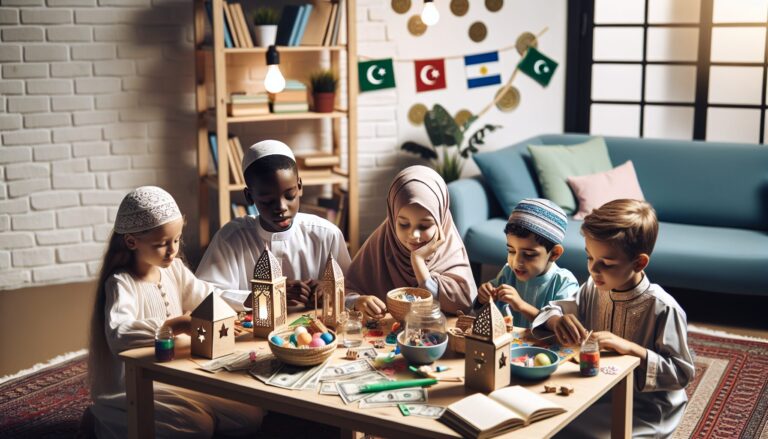Choosing a baby name is such a heartfelt journey, isn’t it? I remember when my cousin had her baby, and we spent hours sifting through names that resonated with her family’s values and beliefs. Islamic baby names are not just labels; they’re rich in meaning and history. These names often reflect the beauty and depth of the Arabic language, embodying qualities like strength, kindness, and wisdom. Many families choose names that have connections to important figures in Islamic history or the Quran. It’s like giving your child a little piece of legacy right from the start. Understanding these names offers a peek into a vibrant culture and helps new parents connect more deeply with their heritage.
Understanding the Importance of Names in Islam

Names hold a special place in Islam, often seen as a reflection of one’s identity and values. When I was expecting my first child, I spent countless hours discussing names with family and friends, trying to find the perfect balance of meaning and melody. It was a journey that taught me not just about names, but about the depth of cultural and religious importance they carry.
In Islam, names are more than just labels. They’re considered a significant part of a person’s identity and can influence character. Parents are encouraged to choose names with positive meanings, as it’s believed that a name can have a profound impact on a child’s life. This idea resonates deeply within the community, as names often reflect a connection to religious figures, virtues, or ancestors. For instance, choosing a name like “Aisha” not only honors a beloved personality but also imbues the child with the qualities associated with her.
Furthermore, names often serve as a link to one’s heritage and faith. They can tell a story of familial ties, cultural roots, and religious devotion. Many families opt for names mentioned in the Quran or those that carry a sense of spiritual significance. Such choices are seen as a way to instill a sense of belonging and identity in children from a young age.
The Role of Naming Ceremonies
In many Islamic cultures, the act of naming a child is marked by a ceremony known as “Aqiqah.” This event is not just about announcing the chosen name but also about celebrating the new life and seeking blessings. During Aqiqah, families often gather to offer prayers and share meals, creating a joyous atmosphere that underscores the importance of the occasion. It’s a beautiful tradition that highlights the community’s role in welcoming a new member and reinforcing the values associated with the name.
Names are a fundamental part of the Islamic identity, and selecting one is a thoughtful process. Organizations like Islamic Relief Worldwide and Islamic Society of North America often provide resources and guidance for parents navigating this significant decision. They emphasize the importance of understanding the meanings and origins of names, ensuring that parents make informed choices. This aspect of naming is especially crucial in a multicultural world where names can sometimes lose their original context or significance.
When considering names for your little one, it’s essential to reflect on the values and meanings you wish to impart. Whether you’re drawn to names that are traditional or modern, each choice carries its own story and significance. A beginner’s guide to Islamic baby names can be a helpful resource in this journey, offering insights into the linguistic beauty and depth that these choices embody.
Popular Islamic Baby Names and Their Meanings
Choosing the perfect name for your little one can be a delightful yet challenging task. Islamic baby names carry deep meanings and cultural significance, making them a popular choice among parents looking for something special. Let’s dive into some popular Islamic baby names and their meanings to help you on this beautiful journey!
One of the cherished names is Amina, which means “trustworthy” or “faithful.” It’s a name that has been loved for generations, with historical significance tied to the mother of the Prophet Muhammad. Exploring such historical connections can be enriched through engaging activities, such as those found in Islamic story activities for beginners. Another lovely name is Zayd, meaning “growth” or “abundance.” It’s a name that not only sounds strong but also carries a positive vibe, perfect for a future leader.
If you’re looking for something with a royal touch, Sultan might catch your fancy. This name signifies “ruler” or “king” and has an air of authority and dignity. On the other hand, if you want a name that’s more nature-inspired, consider Jasmine. Often associated with the fragrant flower, it symbolizes elegance and grace.
Islamic names often reflect virtues and qualities that parents wish to see in their children. For instance, the name Fatima means “captivating” or “one who abstains,” and it’s deeply respected due to its historical connections in Islamic history. Similarly, Hasan means “handsome” or “good,” and it’s a name revered and cherished in many cultures.
Names with Spiritual Significance
Many parents are drawn to names with spiritual meanings. The name Maryam, for example, is not only beautiful but also deeply spiritual, representing purity and devotion. Another name with a profound meaning is Ibrahim, which stands for “father of nations,” carrying a strong biblical and Quranic heritage.
When selecting a name, it’s also essential to consider how it sounds in different languages and cultures. For instance, the name Noor means “light” and is easy to pronounce and appreciated in various cultures. Likewise, Ali, meaning “exalted” or “noble,” is a name that transcends borders and is recognized globally.
While choosing a name is a personal journey, many turn to resources like Muslim Names and Islamic Relief Worldwide for inspiration and guidance. These organizations offer insights into the meanings and origins of names, helping parents make informed decisions. Whether you’re looking for a name with a historical connection or one that simply resonates with your heart, the world of Islamic baby names offers a rich tapestry to explore.
How to Choose the Perfect Islamic Name for Your Baby

Choosing the perfect Islamic name for your baby can be such an exciting journey, filled with meaningful discoveries and heartwarming traditions. I remember when my sister was expecting her little one, and we spent countless evenings sipping tea and browsing through names. It felt like every name had a story to tell, a melody and a meaning that resonated with us. The process was not just about finding a name; it was about finding the right name that would weave into the tapestry of her child’s life.
When it comes to picking an Islamic name, there are a few key things to consider. First, think about the meaning of the name. In Islamic tradition, a name isn’t just a label—it’s a reflection of identity and character. For instance, the name ‘Aisha’ is often chosen for its beautiful meaning and historical significance. It’s always helpful to make a list of names that resonate with you and explore their meanings and origins.
Another aspect to consider is the ease of pronunciation. Names should be easy for your child to live with and for others to say. While you might fall in love with a name that’s a bit hard to pronounce, try to find a balance between uniqueness and simplicity. Trust me, your child will thank you later when they’re not having to correct every teacher on the first day of school!
Considering Family and Cultural Traditions
Family and cultural traditions play a significant role in name selection. Many families choose names that honor past generations or reflect their cultural heritage. This can be a wonderful way to connect your child to their roots. You might find inspiration in names like ‘Sultan’, which carries a sense of leadership and strength, or ‘Amina’, a name that speaks of safety and trust.
Additionally, some families consider the numerology or astrological significance tied to a name. While this isn’t a requirement, it’s a fascinating aspect that some parents enjoy exploring. It can add an extra layer of meaning to your choice.
It can be helpful to consult with knowledgeable individuals or resources. Organizations like Islamic Society of North America and Muslim Names and Meanings can provide valuable insight and guidance. They offer resources and databases that make the search for the perfect name a more enriching experience.
Remember, choosing a name is a significant decision, but it should also be a joyful one. Have fun with the process, and trust that the right name will resonate with your heart when you find it.
Cultural Significance and Variations in Islamic Naming
The cultural significance of Islamic baby names is deeply rooted in history and tradition, offering a rich tapestry of meanings and connections. Names in the Islamic world aren’t just labels; they’re a link to heritage, family, and faith. Imagine a name as a thread weaving through the fabric of one’s identity, binding the past with the present. This cultural practice is cherished and passed down through generations.
Islamic names often carry profound meanings and connect to religious texts or revered figures. For instance, naming a child after a beloved prophet or a significant historical figure is a way of honoring their virtues. Additionally, these names can reflect positive traits parents hope to see in their children. A name like ‘Zayd,’ for example, is associated with growth and abundance, symbolizing the parents’ wish for their child to thrive.
Variations in naming practices also highlight the diverse cultural landscapes within the Islamic world. While some names are universally recognized, others have unique regional flavors. You’ll find variations based on local languages, dialects, and traditions. In North Africa, names might have distinct Berber influences, while in Southeast Asia, you’ll see the blend of Islamic and local cultural elements. Therefore, names can serve as a delightful exploration of cultural diversity.
Regional Influences and Adaptations
Islamic baby names can vary significantly across regions. For example, in Turkey, names like ‘Amina’ might be spelled ‘Emine’ while retaining the same cherished meaning. In South Asia, you might encounter names like ‘Sultan’ or ‘Aisha’ frequently, reflecting the rich history and cultural exchange in the region. Furthermore, names often evolve with linguistic nuances, making them more relatable and meaningful within a specific cultural context.
Another interesting aspect is how parents choose names based on phonetic beauty. The sound of a name is important, and many parents pay close attention to how a name rolls off the tongue. The melodic quality is often a deciding factor, ensuring that the name is pleasant to hear and say.
Names also serve as a connection to family. It’s common for children to be named after grandparents or other relatives, continuing the legacy of family names. This practice adds an intimate layer of personal history and familial bonds, making names even more special. Islamic Society of North America, Al-Azhar University, and Institute of Islamic Studies are key organizations that often delve into the significance of names within Islamic contexts, providing insights and guidance.
The naming process can be a beautiful journey full of reflection and meaning. Whether you’re exploring names for their cultural richness or their personal significance, each name tells a story. These stories become part of the child’s identity, shaping how they see themselves and their place in the world.
Resources for Finding Islamic Baby Names

Embarking on the journey to find the perfect Islamic baby name can be as thrilling as it is meaningful. Whether you’re seeking a name rich in history or one that resonates with contemporary vibes, a few trusty resources can make your search a breeze. So, let’s dive into the treasure trove of resources available to help you find that special name for your little one!
First up, online databases are your new best friends. Websites dedicated to baby names often have sections specifically for Islamic names, with meanings and origins all in one place. These platforms provide an extensive list of names, making it easy to filter by gender, meaning, or region. A fantastic go-to is the comprehensive database offered by Islamic Society of North America, which is a well-regarded source in the community.
Another fantastic resource is literature. Books focusing on Islamic baby names are readily available and often penned by knowledgeable authors who delve into the significance and nuances of each name. With these books, you get more than just a list; you receive stories and histories that bring each name to life. Check out the selections from Al-Azhar University that offer scholarly insights into the cultural and religious importance of various names.
Don’t underestimate the power of community wisdom. Engaging with local communities or online forums can provide personal insights and experiences that aren’t found in books or databases. Many parents share their journeys and the meanings behind their chosen names, offering a personal touch to the search process. Consider joining groups associated with Institute of Islamic Studies to connect with others in similar stages of life.
More Ways to Discover Names
Expanding your search, consider tapping into cultural events or festivals. These gatherings often highlight historical figures and stories that can inspire name choices. Additionally, speaking with family members or elders can unearth ancestral names that carry unique legacy and significance. You might discover a name that’s been cherished for generations, adding a layer of family history to your child’s identity.
Ultimately, the journey to find the right name is a deeply personal one. By utilizing these resources, you’ll be well-equipped to choose a name that not only sounds beautiful but also carries profound meaning and heritage.
Conclusion
In essence, the journey of choosing an Islamic baby name is a profound exploration of cultural heritage, spiritual significance, and personal identity. This process, rich with tradition and meaning, not only honors one’s faith and ancestry but also sets the foundation for a child’s future. Through thoughtful consideration and the wealth of available resources, parents can find a name that beautifully reflects their values and dreams for their child. Happy naming!
Continue Exploring
Unlock the secrets to nurturing your child’s Islamic knowledge with cutting-edge methods tailored for 2025. Dive into the future of learning today!
Frequently Asked Questions
Why are Islamic baby names considered significant in Islam?
In Islam, names are more than just labels; they are reflections of one’s identity and values. Parents are encouraged to choose names with positive meanings, as it is believed that a name can influence a child’s character and life. Many Islamic names are connected to religious figures or virtues, emphasizing cultural and spiritual heritage.
What is the Aqiqah ceremony in Islamic culture?
The Aqiqah ceremony is a traditional event in many Islamic cultures that marks the naming of a child. It involves announcing the chosen name, celebrating the new life, and seeking blessings. Families gather to offer prayers and share meals, reinforcing the community’s role in welcoming the new member and the significance of the chosen name.
How can parents choose the perfect Islamic name for their baby?
To choose the perfect Islamic name, parents should consider the meaning and pronunciation of the name, ensuring it reflects the desired identity and is easy to say. Family and cultural traditions, as well as resources like online databases, literature, and community wisdom, can provide valuable insights and guidance in this meaningful journey.
Fatima Ansari is an Islamic educator and writer with over a decade of experience teaching Quran and Islamic studies to children and families in Western Muslim communities. Growing up in North America, she saw firsthand the challenges Muslim families face in balancing faith with modern life, which inspired her to share practical guidance rooted in the Quran and Sunnah. Her mission with E-Quran Learning is to make Islamic education accessible, relatable, and inspiring for Muslim families across the United States, United Kingdom, Canada, Australia, and New Zealand.






